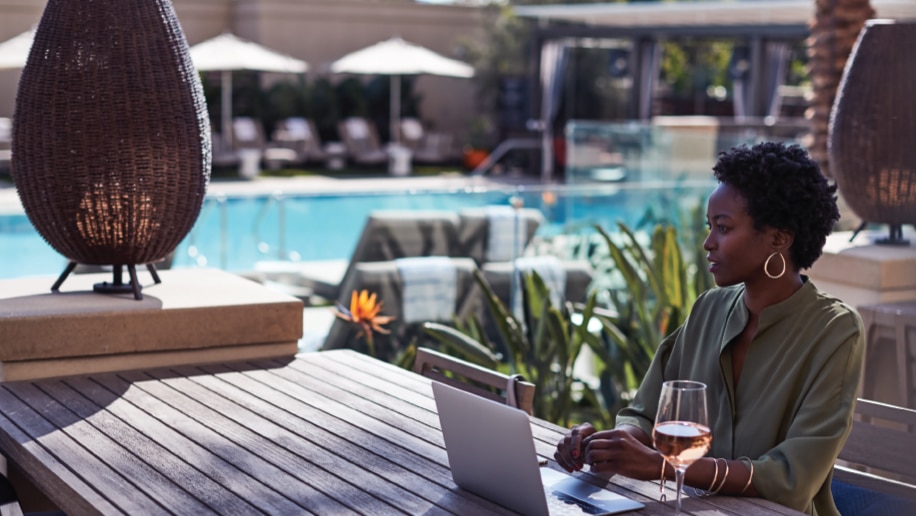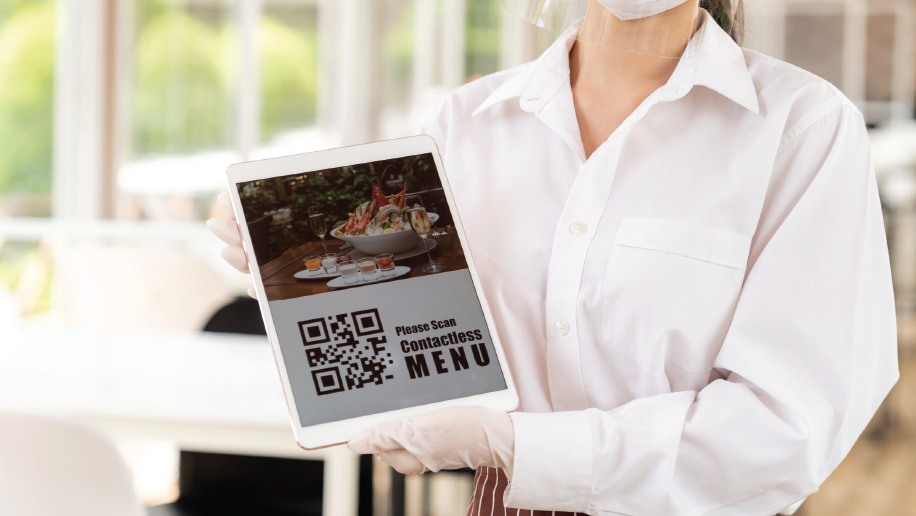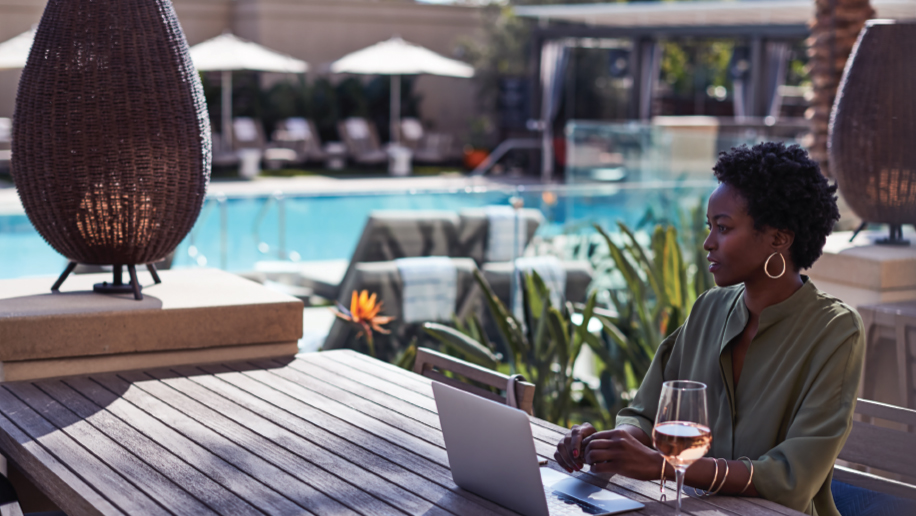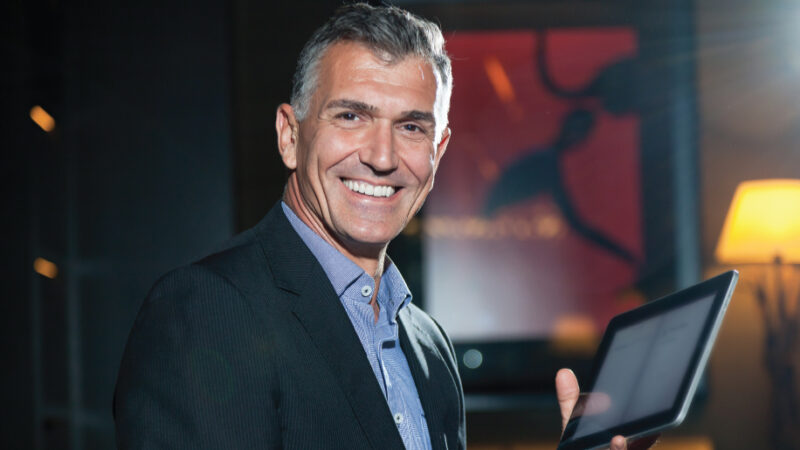Hospitality Redefined
In a post-pandemic world, the hotel business is learning to speak a different language
June 9, 2021

Staycations. Single-sided buffets. Mobile concierge. Contactless technology. A whole new vocabulary has sprung up around hospitality as a result of the pandemic, reflecting just how much the lodging industry had to adapt to a difficult time.
Business travelers who had been used to spending a high percentage of their nights in a guestroom are now returning to hotels after more than a year at home. What they find may be unfamiliar or even surprising as hoteliers responded to the crisis with many changes – some profound and some cosmetic – and some of which may be here to stay. As many have said, a crisis might not originate trends but it may accelerate them.
According to a report called “Rebuilding Hospitality: Trends in Demand, Data and Technology That Are Driving Recovery,” from hospitality data provider Amadeus Demand360, travelers might find:
• Enhanced hygiene measures are here to stay: A third (32 percent) of hoteliers think that they will always need social distancing, sanitization and visible hygiene measures.
• Long-term reduction in guest contact and housekeeping: 20 percent of global hoteliers indicate they will keep interaction between staff and guests to a minimum, and 21 percent plan to reduce daily housekeeping.
• Personalization could help cross the contactless hospitality divide: 30 percent of respondents said that contactless technology to support personalized guest experiences was an exciting development.
• Work ‘staycations’ and long stay rental investments: Creative business pivots like offering work ‘staycations’ (or ‘workcations’) and investing in facilities that help travelers prolong stays have helped hoteliers test strategies to access new guest segments.
Flexibility to the Forefront
The changes start with the booking itself and with policies around cancellations. Kimberly Wilson, senior vice president of global sales-corporate for Preferred Hotels & Resorts, says some travel buyers are requesting that hotels offer “day of” cancellation or cancellation by 4 PM due to travel restrictions that could alter arrival or departure plans. Operators who work with travel buyers to extend greater flexibility, she says, will be among those to see the fastest return of their corporate traveler revenue.
Derek DeCross, senior vice president, global sales for IHG Hotels & Resorts, says that with restrictions constantly shifting, the company offers multiple options: Best Flexible Rate with bookings changeable and fully refundable up to 24 hours in advance; Advance Saver, where travelers get extra savings for booking early with deposit and cancellation penalties applying; and IHG Rewards Reward Nights where guests can change or cancel bookings with no penalty before a cancellation deadline.
The focus on increased flexibility “will only continue as we move out of the pandemic,” says Carol Lynch, senior vice president of sales for Wyndham Hotels & Resorts. And that extends to loyalty programs. Lynch says status for all members of the Wyndham Rewards program has been extended globally through 2021 at the current Member Levels.
Going (Even More) Digital
While check-in had already been changing pre-pandemic, says Wilson, the check-in/arrival process will continue to evolve as more hotels upgrade their technology platforms. Additionally, they are ramping up acceptance of virtual credit card or contactless payments.
For example, according to Asad Ahmed, senior vice president of commercial services, Americas at Hyatt Hotels & Resorts, enhanced digital check-in available through Hyatt.com and the World of Hyatt mobile app lets guests see their assigned room, make changes or receive notifications on upgrades, all without visiting the front desk. Enhanced check-in also allows guests to manage the housekeeping scheduling.
Mike Gathright, senior vice president-customer experience for Hilton, says that digital key which lets guests open their room door with a phone is now available in 80 percent of Hilton hotels. Along with that come other contactless functions of the Hilton Honors app, such as being able to choose your room and go straight to it with no need to stop at the front desk at check-in or check-out.
And the Marriott Bonvoy mobile app gives members a choice of mobile check-in, mobile request and mobile key from their phones, says Kathy Mouw, Marriott International’s vice president, global sales – US and Canada. Mobile key is now available at over 4,300 of the company’s hotels, she adds.
Rooms Revisited
What hotels did during the pandemic, says Mike Schugt, president of Teneo, a sales representation provider, was “take a lot of things out of rooms that guests might touch” – like books and even coffee makers. Some removed bedding like duvets – all in an effort to reduce touch points and enhance hygiene. “I don’t know that anyone misses that stuff,” he says, adding the items are often “trinkets and trash.”
During their next business trip, those who have not traveled since the pandemic began, says Gathright, will encounter elevated guest room cleanliness standards such as those denoted by the Hilton CleanStay room seal. As a result, guests may also notice the removal of paper amenities, though these are available upon request.
Food and Beverage Revolution
Perhaps nothing was more affected by the pandemic than food and beverage, with restaurants closing, buffets disappearing and grab-and-go becoming standard fare. And it seems many of these pandemic-driven disruptors will linger. For instance, there has been an uptick in so-called grab-and-go options that mimic a high-end grocery store, says Wilson. In restaurants, guests can still have the full-service experience; however, paper menus are being replaced with QR codes, and dining times may be altered.

Digital advancements like QR codes for menus, says Ahmed, make it easier for food and beverage teams to support mobile payments for restaurant order pick-up or contactless knock-and-go room service.
In fact, says Schugt, room service may disappear entirely from many hotels – or will change to an experience more akin to Uber Eats, with someone dropping off a bag at the room door. “We have gotten used to this in our homes,” he says, “so why not in hotels?”
At larger properties, says Wilson, buffets will transition from being self-serve stations to stations serviced by staff. Also, outdoor dining space has become more popular, with hotels converting various areas to appeal to those wanting an al fresco experience, a trend she sees continuing even in cold-weather destinations.
As hotels return to normal service, says Gathright, pandemic-driven innovations like virtual wine tastings may fade. Instead, travelers might see their favorite cocktails appearing pre-made within hotel grab-and-go markets or even at bars.
At Best Western, says Dorothy Dowling, senior vice president and chief marketing officer, hotels have embraced temporary breakfast offerings, including an enhanced grab-and-go breakfast with pre-packaged food and beverages, and “served” or pre-plated breakfasts to minimize guest contact with food and beverages.
IHG’s full-service brands may offer guests alternative options like breakfast in bed, chef’s table in the room, and coffee and tea barista experiences, DeCross notes.
The pandemic has driven innovation in food and beverage, says Mouw, with chef-staffed action stations, single-sided buffets, specialty bars and the use of non-traditional event spaces and outdoor venues.
Working “Differently”
A dramatic pandemic-induced phenomenon came when employees stuck at home for months – and working from their bedrooms – thought, “Why can’t I do this from somewhere different and more pleasant?” Thus was born the “work staycation” or “workcation” – a trend that many think has staying power as travelers remain in one hotel for weeks or months at a time while working remotely.

Hyatt leaned into the work-from-anywhere trend early, says Ahmed, when the company launched Work from Hyatt in August 2020. That package offers a workspace that may include suite accommodations, a connecting room for families to spread out and/or a private meeting room to take (virtual) business meetings. Guests get daily food and beverage credits, complimentary or discounted laundry services and free WiFi. Hyatt expanded on that with the Office for the Day option and The Great Relocate package, which lets travelers spend a month or more at a Hyatt property.
Other brands feature similar possibilities. The Marriott Bonvoy Work Anywhere program, says Mouw, offers flexible options whether guests are seeking a one-day stay to get some work done or a multi-day work and leisure destination getaway.
Contactless Context
Many hoteliers like Lynch think “contactless and low-contact hotel experiences are here to stay.” A good example, she says, is the rollout of the OPERA Cloud property management system. This mobile-enabled platform helps hotels deliver a greater guest experience through a host of operational enhancements, one of which is the ability to process contactless payment.
Best Western’s Mobile Concierge, says Dowling, empowers guests by giving them access to everything they need during their stay from their mobile device. They can request extra towels or text the front desk to ask about what’s open in the local area – all from their own room.
The greatest impact for contactless technology is meetings, says Wilson. She does not foresee virtual meetings ever replacing in-person gatherings but expects hybrid events to become the new normal. Virtual capabilities and contactless technology have increased the reach of many conferences, she says, allowing companies to connect with more clients or associates at one time than ever before, “and it has been incredible to see what hotels have done to attract this business.”
“Revenge of the Lobby”
While lobbies were empty during the pandemic, many in the industry believe they will see a strong revival as travelers are eager to reconnect for socializing and work in what Schugt calls the pulsing “heartbeat” of a hotel. While many predict a massive “revenge travel” movement as people get back on the road, he sees a “revenge of the lobby” in a public space that should have food, music, a scent and a feeling of the city.
Motto by Hilton is a new brand that uses its lobbies, called the Motto Commons, as “a neighborhood gathering space,” says Larry Traxler, senior vice president-global design for Hilton. Guests can begin and end their days with local craft coffee, a full-service bar and curated local cuisine. The Commons offers varied seating options (work, group and lounge), convenient power plugs and plenty of natural light.
As the workplace has been dramatically disrupted by the virus and companies are adopting a work from home model, says DeCross, hoteliers are looking at new ways to engage a new wave of ‘bleisure’ – business and leisure – customers. Travelers, he says, are looking at hotels to offer the conveniences they expect in an office, with the perks that they can’t get at home
When business travelers do return to hotels, they’ll find that a massive crisis drove innovation that extends well beyond simply a new vocabulary.




